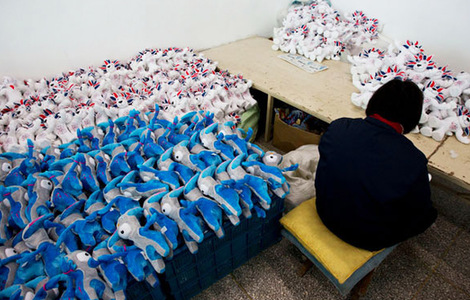Kidnapped Chinese scapegoats of local disputes
Updated: 2012-02-07 15:07
(Xinhua)
|
|||||||||||
BEIJING - More than two dozens of Chinese workers were kidnapped in Sudan after their camp was attacked by local rebels on January 28, and three days later another 25 workers were kidnapped in Egypt.
A total of 29 Chinese workers are still held in Sudan, while those in Egypt were released last Wednesday.
Experts said the kidnappings of overseas Chinese in recent years were usually motivated by political goals rather than the desire for money, and had nothing to do with Chinese policies.
Han Ruihua, deputy manager of Taida Investment Company in Egypt, told Xinhua that Chinese workers' safety depended on the security situation of the countries where they worked.
Political groups in some countries resorted to kidnapping foreigners to increase bargaining chips in negotiations with governments, Han added.
He also warned if the political and security situation in Egypt continues to deteriorate, similar incidents could happen again.
Li Guangming, project manager of Shandong Hi-speed Group in Pakistan, agreed with Han, saying that as China continues to expand its influence abroad, some armed groups start kidnapping and attacking Chinese workers to put pressure on their local governments.
Hao Hongshe, Commercial Counsellor of Chinese Embassy in Sudan, pointed out that as part of the "going out" strategy, more and more Chinese companies are exploring and expanding business opportunities in developing countries, some of which are poor and politically unstable.
As a result, security issues have loomed larger and larger in recent years for overseas Chinese workers, he added.
On prevention measures, Hao suggested that Chinese companies take measures to raise the safety awareness of overseas Chinese workers and increase investments in security.
Wang Xifeng, deputy manager of China Civil Engineering Group in Nigeria, said Chinese companies should avoid getting involved in local political or tribal disputes.
In case of security incidents, Han suggested companies inform the Chinese embassies in the first place and take appropriate measures to help workers deal with the shock.
For others, it is important to write it into contracts that local governments should provide much-needed security assurances.
"When signing cooperation agreements with Yemen, we required the Yemeni side to provide sufficient security protection, even by deploying armed forces, to protect Chinese workers and properties. This helped us a lot in restive times," General Manager of Sinopec in Yemen Huang Lixin said.
Hot Topics
Kim Jong-il, Mengniu, train crash probe, Vaclav Havel, New Year, coast guard death, Internet security, Mekong River, Strait of Hormuz, economic work conference
Editor's Picks

|

|

|

|

|

|







